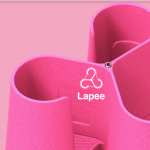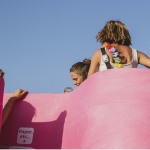When people think of music festivals they think of bright lights, loud music, alcohol and crowds of people coming together. They rarely consider the practical aspects of using the toilet at these festivals. For women, the reality is a less than desirable situation with endless lines for portable toilets, but on the other hand men are catered for with ample urinals.
However, all this is set to change with a ground-breaking invention from Danish architect and design duo Alexander Egebjerg and Gina Périer – founders and chief executive officers of Lapee, the world’s first industrialised female urinal. With a promise of no more lines for women, Lapee is taking the music festival scene by storm.
We speak with Alexander from the start-up about the product and to Maria Dam Jensen from AWA on protecting the brand and the invention.
Interview with Alexander:
How did Lapee come about?
Gina and I are both architects, we are always thinking about inventions. About two years ago we looked into the problem that festivals have mobile and industrialised male urinals, but nothing for women.
We found this strange and considered that it cannot be that difficult to change the design for women. So we started looking at the male product and realised early-on that we had to keep all the features in terms of handling, cleaning and other practical aspects so that festivals and the rental companies (who supply the products) could use our product in the same way.
The result of this is that Lapee is manufactured with the same material and methods as the male urinals, which have been around for over 30 years. Once we convinced the rental companies, we had to get women onboard, but when faced with a 30-minute queue five or six times a day – it is easy to understand why they want to try out the Lapee. We have seen everyone using the Lapee – from teenagers to seniors. Giving them all the opportunity to return to the music festival much faster than waiting for a portable toilet.
What would you say have been some of the biggest challenges?
Definitely raising capital for this venture, sourcing engineers and consultants as well as the dialogue needed with festivals, the production facility we use and the rental companies. Gina and I started the company without a background in business, so we have had a journey learning along the way in terms of business activities.
What is the business model?
We have a partnership with the largest rental company in Denmark. This provided us with a model that brought Lapee into the market. Over the summer, rental companies from all over the world have contacted us enquiring and placing orders. We are still a small organisation, but we are looking to increase production over the next few months to meet demand.
Where do you see Lapee in a few years?
The rental companies we work with facilitate a lot of different kinds of events, not only festivals. I see great potential at marathons, which would really aid in gender equality as women can find themselves at a disadvantage currently. With Lapee they can stay hydrated and focused on winning the race as there is a fast and easy option for them to use the toilet.
The product is definitely for outdoor events, but we could see a version of this in established interior bathrooms in the future. However, we think of the Lapee as part of a movement, to educate women and the world that it is okay to pee. Women should be proud of this and it is never fair for them to line-up for hours just to use the bathroom.
How early on did you start thinking about brand and invention protection?
Quite early on as once we knew that we had found a solution it would be worth considering IP protection. In the beginning, we kept the idea to ourselves and did not really engage with anyone. After about half a year and when we had developed the prototype, we started filing for patents and designs.
What advice would you offer to startups?
It is always going to be difficult and it is important to be protective about your invention. At the same time, it is important to communicate and involve people to gain knowledge, but in terms of protection, IP is the only weapon you have as a start-up.
One advantage start-ups have over established businesses is that they can act quickly and execute on ideas very fast. Gina and I think it is great to optimise, sit down and work with an idea until its finished. Large companies like Apple and Google do not have this luxury, so start-ups should really embrace this ability to be able to just go with it.
One advantage start-ups have over established businesses is that they can act quickly and execute on ideas very fast – Alexander
Interview with Maria
How did you become involved with Lapee?
AWA meet Lapee through the startup community connected to the Copenhagen Business School (CSE) and as they were in need of advice on trademarks, they were referred to me.
How did you go about protecting and formulating a brand strategy for Lapee?
Lapee had been active themselves in taking the initiative to protect their IP, with patent and design applications in place. We took it to the next level by combining protection for all their IP. They are now protecting both the technical and visual features of their products through patents and designs, also their name and logo as trademarks.
When working with a startup strategy is key, bearing in mind that they do not have all the money in the world and that their business is at a very early stage in their cycle. So when giving advice it is important to be very clear and precise in their options and in terms of the consequences in order to give them the best basis for prioritising within their budget.
When working with a startup strategy is key, bearing in mind that they do not have all the money in the world and that their business is at a very early stage in their cycle – Maria
To what extent would you say the IP strategy for Lapee is aligned with their business activities? And how is important is this for a startup company?
Given that Lapee from an early stage has been attentive to IP, their business is well aligned. Even though it might seem like a hurdle in the budget for a startup company, it is extremely important to know what IP you have and how to exploit this in the best way.
We regularly see that investors pay close attention to IP and often require companies to have their rights in place before they will invest. I highly recommend at least knowing what IP you have and know how you can protect it. In that way, you can at least explain why you have or have not protected it and you can make informed decisions for your business at the different stages throughout the corporate cycle.
The world’s first industrialised female urinal
The opportunities for Lapee are many at this early stage. It is likely that it will not be long before you see a Lapee at a musical festival near you. For the first time, women can feel empowered at events not disadvantaged.





